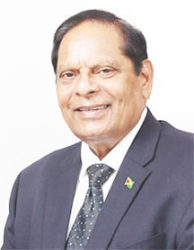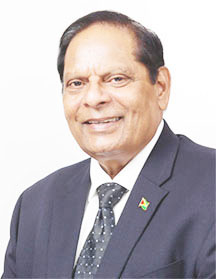Even with a budget of $80 million and a commitment from the United Nations to offer both technical and financial support, the APNU+AFC government has made no concrete efforts to realize constitutional reform.
Prime Minister Moses Nagamootoo who holds the portfolio of Governance including the responsibility for Constitutional Reform has been evasive about how exactly the process will be realized. Months of requests to both him and his press secretary Imran Khan for clarity on this issue have gone unanswered. Additionally, Stabroek News has not been able to make contact with the PM on this issue over the last month despite repeated calls to his mobile number.

In his budget presentation last year for 2017, Minister of Finance Winston Jordan committed $80 million to the establishment of “an administrative secretariat to manage the reform process and support the consultations, which are scheduled to begin in 2017.”
Since that time Nagamootoo has explained to Stabroek News that a bill for the Constitutional Reform Consultative Com-mission is being crafted.
In May he said that “at this stage what is important to take the process [of constitutional reform] forward is to have a constitutional reform commission established and you can’t have that until there is a law under which they will function.”
At that point the draft bill had been returned to the PMs Office from the Attorney General with a request that several changes be made. Nagamootoo had explained that once approved by the AG the bill will be sent to a Special Select Committee for further review once it is tabled in the National Assembly.
One month later and a total of two years in office the public is not clear as to how the process is moving.
Constitutional reform was one of the manifesto priorities of the APNU+AFC government during its 2015 elections campaign. While the manifesto promised that within three months of taking office, an APNU+AFC government would appoint a Commission to amend the Constitution with the full participation of the people this has not occurred.
“APNU+AFC recognizes that the Constitution, in its current form, does not serve the best interest of Guyana or its people. Within three months of taking up office, APNU+AFC will appoint a Commission to amend the Constitution with the full participation of the people. The new Constitution will put the necessary checks and balances in place to consolidate our ethos of liberal democracy. Freedom of speech, reduction of the power of the President and the Bill of Rights will be enshrined in the document,” the document stated.
The manifesto further stated that constitutional, electoral and parliamentary reforms are imperative. In this regard, an APNU+AFC government upon taking office will immediately appoint a Constitutional Reform Commission consisting of representatives of all major stakeholders – trades unions, the private sector, religious and faith-based organisations, women, youths, professional organizations and the University.
Rather than fulfill this commitment government established a Steering Committee on Consti-tutional Reform (SCCR) in August, 2015.
Attorneys Nigel Hughes, Gino Persaud and Geeta Chandan-Edmond, as well as Professor Harold Lutchman and the late Haslyn Parris were on the committee. The remit of the committee was to give direction and scope within which the constitutional reform process should take place. The SCCR submitted a report to the government on April 30, 2016 but this to date has not been released by the government to the public although Stabroek News has reported on its contents.
Another report was commissioned in February 2017. A team of constitutional experts from the United Nations (UN) system arrived here to conduct a constitutional reform needs assessment mission. The report produced by the UN experts was also not made public by the government but Stabroek News has reported on it.
These actions do not accord with the declaration by Minister Jordan that government would in 2017 “work assiduously to accelerate the constitutional reform process.”
Jordan had assured the house that “consistent with the broad tenets of participatory democracy, the Constitutional Reform Commission will hold consultations in all ten administrative regions. Over one hundred communities will be engaged in consultations and hearings and the entire process is expected to last for at least two years.”
He had also revealed the commitment of $80 million to the process, yet President David Granger told Stabroek News on Wednesday that government is now looking at money to finance the process.
“We have made some progress… we had the first proposal. I think there is a question now of financing the process because we want to have a consultative process but it is moving it hasn’t been halted,” the president stated.






